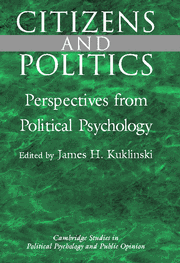Book contents
- Frontmatter
- Contents
- List of Contributors
- Prologue: Political Psychology and the Study of Citizens and Politics
- PART I AFFECT AND EMOTIONS
- PART II POLITICAL COGNITION
- Introduction
- 5 An Experimental Study of Information Search, Memory, and Decision Making During a Political Campaign
- 6 Political Accounts and Attribution Processes
- 7 The Motivated Construction of Political Judgments
- 8 Commentary: On the Dynamic and Goal-Oriented Nature of (Candidate) Evaluations
- PART III POLITICAL ATTITUDES AND PERCEPTIONS
- PART IV POLITICAL VALUES
- Index
- Titles in the series
8 - Commentary: On the Dynamic and Goal-Oriented Nature of (Candidate) Evaluations
Published online by Cambridge University Press: 07 October 2011
- Frontmatter
- Contents
- List of Contributors
- Prologue: Political Psychology and the Study of Citizens and Politics
- PART I AFFECT AND EMOTIONS
- PART II POLITICAL COGNITION
- Introduction
- 5 An Experimental Study of Information Search, Memory, and Decision Making During a Political Campaign
- 6 Political Accounts and Attribution Processes
- 7 The Motivated Construction of Political Judgments
- 8 Commentary: On the Dynamic and Goal-Oriented Nature of (Candidate) Evaluations
- PART III POLITICAL ATTITUDES AND PERCEPTIONS
- PART IV POLITICAL VALUES
- Index
- Titles in the series
Summary
The three preceding chapters offer important conceptual and methodological insights for the study of candidate evaluation. Moreover, they provide information relevant to social evaluation processes in general, regardless of the nature of the target being evaluated. In this chapter, we shall offer some comments and ideas elicited by these chapters. These comments emerge from our own perspective as researchers interested in evaluation processes primarily in the context of consumer advertising campaigns. Thus, we seek not to evaluate the chapters in light of the literature on political psychology or political science, but instead to offer some integrative observations regarding the relation between the present formulations and those used in the study of consumer judgments, as well as the study of social judgments more generally.
OVERVIEW OF CHAPTERS
The chapter by Lau and Redlawsk approaches the issue of candidate evaluation from the perspective of behavioral decision theories (e.g., Abelson and Levi, 1985; Einhorn and Hogarth, 1981; Slovic, Fischhoff, and Lichtenstein, 1977). These are models that focus primarily on choice processes and for which choice decisions are often the central dependent variables. In contrast, the chapters by Taber, Lodge, and Glathar and by McGraw approach candidate evaluation primarily from the perspective of attitude models such as information processing theory (McGuire, 1968,1972) that focus on appraisals of individual targets. For these types of models, absolute judgments are typically the dependent variables of interest.
- Type
- Chapter
- Information
- Citizens and PoliticsPerspectives from Political Psychology, pp. 227 - 240Publisher: Cambridge University PressPrint publication year: 2001

